
B.S. in Computer Science
Course Catalog
General Education
The BS in Computer Science integrates the Computer Science Department's technical requirements for the major with the university's general education requirements to prepare the student for a career in the computing field and for further study in the computing sciences.
Visit the Computer Science Department office for advising materials for previous catalog years.

Computer Science Discipline
"Computer science spans a wide range, from its theoretical and algorithmic foundations to cutting-edge developments in robotics, computer vision, intelligent systems, bioinformatics, and other exciting areas. We can think of the work of computer scientists as falling into three categories.
- They design and implement software. Computer scientists take on challenging programming jobs. They also supervise other programmers, keeping them aware of new approaches.
- They devise new ways to use computers. Progress in the CS areas of networking, database, and human-computer-interface enabled the development of the World Wide Web. Now CS researchers are working with scientists from other fields to make robots become practical and intelligent aides, to use databases to create new knowledge, and to use computers to help decipher the secrets of our DNA.
- They develop effective ways to solve computing problems. For example, computer scientists develop the best possible ways to store information in databases, send data over networks, and display complex images. Their theoretical background allows them to determine the best performance possible, and their study of algorithms helps them to develop new approaches that provide better performance.
…computer science offers a comprehensive foundation that permits graduates to adapt to new technologies and new ideas."
Description of the discipline from ACM+IEEE Computer Science Curricula 2013 (PDF)
Mission
The Department's Mission is to advance knowledge in the computing sciences by providing our students with the highest quality educational experience. The Department strives to:
- Provide excellence in teaching;
- Develop a community of scholars that includes faculty, staff, students and alumni;
- Provide service to others;
- Respond to the changing demands for trained computing professionals.
Program Educational Objectives
Program Educational Objectives are broad statements that describe the career and professional accomplishments that the program is preparing graduates to achieve. The Program Educational Objectives of the CSU, Chico Computer Science Program are to produce graduates who demonstrate the following, within three to five years after graduation:
1. Those employed in industry, government, or entrepreneurial endeavors will demonstrate professional advancement through significant technical achievements, expanded leadership responsibility, or other recognition of their contributions;
2. Those who continue their formal education will achieve an advanced degree or certification in programs in computing, science, engineering, business, and other professionally related fields; and
3. All graduates will demonstrate the ability to work effectively as a team member and/or leader in an ever-changing professional environment.
Student Learning Outcomes
Program learning outcomes are narrower statements that describe what students are expected to know and be able to do by the time of graduation. Students completing the computer science program must demonstrate:
1. Analyze a complex computing problem and to apply principles of computing and other relevant disciplines to identify solutions.
2. Design, implement,and evaluate a computing-based solution to meet a given set of computing requirements in the context of the program's discipline.
3. Communicate effectively in a variety of professional contexts.
4. Recognize professional responsibilities and make informed judgments in computing practice based on legal and ethical principles.
5. Function effectively as a member or leader of a team engaged in activities appropriate to the program’s discipline.
6. Apply computer science theory and software development fundamentals to produce computing-based solutions.
CSCI Department
California State University, Chico
215 O'Connell Technology Center
Chico, CA 95929-0410
Tel: 530-898-6442
cscistudent@csuchico.edu
Copyright © 2015 CSU, Chico
All Rights Reserved
